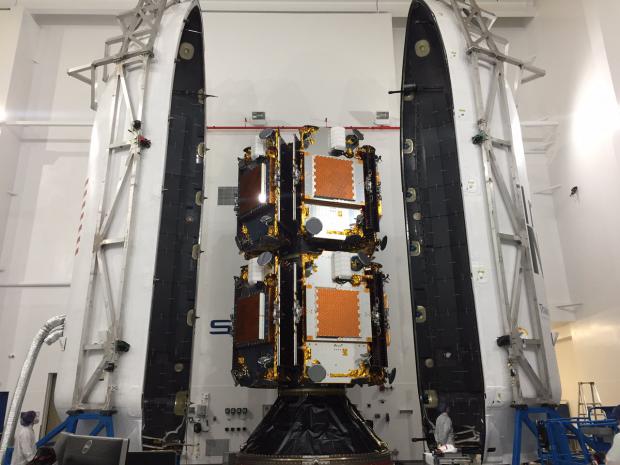
Breaking News
 Pentagon To Send 200 Troops to Nigeria
Pentagon To Send 200 Troops to Nigeria
 Trump Says He May Send Second Aircraft Carrier to Middle East To Prepare for Potential Attack...
Trump Says He May Send Second Aircraft Carrier to Middle East To Prepare for Potential Attack...
 A Market Crash and Recession Are Bullish, Not Bearish
A Market Crash and Recession Are Bullish, Not Bearish
 What Are They Still Hiding? New Epstein Questions Point to a Much Bigger Cover-Up
What Are They Still Hiding? New Epstein Questions Point to a Much Bigger Cover-Up
Top Tech News
 Drone-launching underwater drone hitches a ride on ship and sub hulls
Drone-launching underwater drone hitches a ride on ship and sub hulls
 Humanoid Robots Get "Brains" As Dual-Use Fears Mount
Humanoid Robots Get "Brains" As Dual-Use Fears Mount
 SpaceX Authorized to Increase High Speed Internet Download Speeds 5X Through 2026
SpaceX Authorized to Increase High Speed Internet Download Speeds 5X Through 2026
 Space AI is the Key to the Technological Singularity
Space AI is the Key to the Technological Singularity
 Velocitor X-1 eVTOL could be beating the traffic in just a year
Velocitor X-1 eVTOL could be beating the traffic in just a year
 Starlink smasher? China claims world's best high-powered microwave weapon
Starlink smasher? China claims world's best high-powered microwave weapon
 Wood scraps turn 'useless' desert sand into concrete
Wood scraps turn 'useless' desert sand into concrete
 Let's Do a Detailed Review of Zorin -- Is This Good for Ex-Windows Users?
Let's Do a Detailed Review of Zorin -- Is This Good for Ex-Windows Users?
 The World's First Sodium-Ion Battery EV Is A Winter Range Monster
The World's First Sodium-Ion Battery EV Is A Winter Range Monster
 China's CATL 5C Battery Breakthrough will Make Most Combustion Engine Vehicles OBSOLETE
China's CATL 5C Battery Breakthrough will Make Most Combustion Engine Vehicles OBSOLETE
SpaceX Launches 10 New Iridium Satellites, Sticks Rocket Landing

The private spaceflight company SpaceX successfully launched 10 communications satellites into low-Earth orbit today (Oct. 9) and landed the spent Falcon 9 first-stage rocket booster on a drone ship in the Pacific Ocean.
The SpaceX Falcon 9 rocket took off from Vandenberg Air Force Base in California at 8:37 a.m. EDT (1237 GMT/5:37 a.m. EDT), carrying 10 satellites for Iridium Communications, as part of the company's Iridium Next constellation. The first stage of the two-stage Falcon 9 landed on SpaceX's drone ship "Just Read the Instructions" in the Pacific about 7.5 minutes after the launch.
"Looks like we've got a good orbit," said John Insprucker, SpaceX's Falcon 9 principal integration engineer, just after the launch during live webcast commentary.
The Iridium Next satellites were deployed 57 minutes after liftoff, with the entire process taking about 15 minutes, according to a SpaceX flight plan.
"We're 10 for 10!" Insprucker said. "A clean sweep of Iridium Next satellite deployment in the desired final orbit."
The Iridium Next constellation will eventually consist of 66 primary satellites and nine on-orbit backup satellites. This is the third of eight scheduled SpaceX launches for the Iridium Next constellation, which brings the total number of satellites now in orbit up to 30.
Today was the first flight of this particular Falcon 9 first-stage booster, a company representative told Space.com. SpaceX has successfully flown Falcon 9 boosters that were previously used, and plans to use a pre-flown booster to launch another communications satellite into orbit on Wednesday (Oct. 11), from NASA's Launch Complex 39A at the Kennedy Space Center in Florida.
Today's mission also marked SpaceX's 14th launch this year and the 17th successful landing of a Falcon 9 first stage. SpaceX has been reusing Falcon 9 first stages and is pursuing fully reusable rockets in an effort to lower the cost of spaceflight.
A SpaceX Falcon 9 rocket first stage stands atop the drone ship "Just Read The Instructions" in the Pacific Ocean after successfully launching 10 Iridium Next satellites into orbit from California's Vandenberg Air Force Base on Oct. 9, 2017.
Credit: SpaceX
Iridium Communications announced earlier this week that it had begun testing and validating its Iridium Certus service, which will utilize the Iridium Nextsatellites to provide a "truly global broadband service" to its users, according to a statement from the company. The 66 satellites will spread out around the planet to provide service to remote regions of the globe, the company has said.
At an industry conference last spring, Iridium representatives discussed the ways that the satellite constellation could be used to better keep track of airplanes, particularly over open ocean where ground-based tracking systems are unavailable. The commercial service is expected to be available in the "early second quarter" of 2018, according to the statement.
Follow Calla Cofield @callacofield. Follow us @Spacedotcom, Facebook and Google+. Original article on Space.com.




